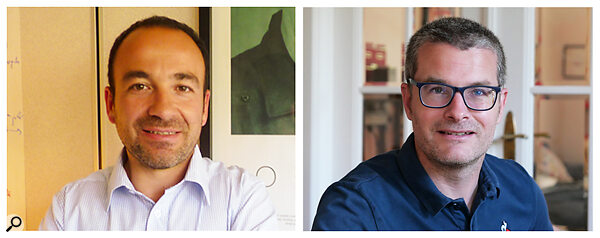 Arturia President Frédéric Brun
Arturia President Frédéric Brun
Arturia President Frédéric Brun looks back over the French company's 20‑year history and describes the development of instruments such as the ambitious Origin, the best-selling MiniBrute, and the mighty MatrixBrute and PolyBrute.
Show Notes
Chapters
 Arturia Storm00:00 - Introduction
Arturia Storm00:00 - Introduction00:43 - Education and Beginnings
02:35 - Developing The First Product, Storm
04:35 - Making Music Tech More Accessible
06:52 - The Challenges Of Selling Early Software Products
 Arturia Moog Modular virtual instrument09:04 - Recreating Classic Synths in Software
Arturia Moog Modular virtual instrument09:04 - Recreating Classic Synths in Software11:43 - Important Moments in Arturia's History
14:11 - Making Soft Synths For iOS
16:48 - The Move Into Hardware Instruments
18:38 - Origin Modular System
20:33 - Developing The MiniBrute
 Arturia PolyBrute23:08 - The Steiner-Parker Filter
Arturia PolyBrute23:08 - The Steiner-Parker Filter 25:05 - MatrixBrute and PolyBrute
27:37 - Breaking into the Interface Market
31:14 - Creating Tactile Instruments
34:10 - The Future Of Arturia
35:52 - Utilising New Technology
36:57 - Developing For The End User
38:39 - Ending
Arturia - Biog
Co-founded by Frédéric Brun and Gilles Pommereuil and based in the French city of Grenoble, Arturia have built on their roots as pioneering developers of virtual instruments to become one of the world's leading manufacturers of analogue, digital and software synthesizers, controller keyboards and audio interfaces.
2003 saw the release of their first software synth, the Modular V followed by the DX7, ARP 2600, Oberheim OB‑X, Buchla, Jupiter 8 and many more classic synths developed using True Analog Emulation (TAE), an advanced proprietary technology allowing accurate modelling of analogue circuitry behaviour.
In 2009 Arturia moved into hardware with the introduction of Origin, a very ambitious synthesizer, and continued inventing new products launching the first of the Brute line in 2012. MiniBrute instantly became a landmark in the industry and was followed by the MicroBrute, DrumBrute, MatrixBrute and their latest keyboard synthesizer, the PolyBrute. Along the way they also launched the popular KeyStep and KeyLab controller keyboards and more recently branched out into audio interfaces, with their AudioFuse range.
 Co-founders of Arturia: Frédéric Brun and Gilles Pommereuil
Co-founders of Arturia: Frédéric Brun and Gilles Pommereuil
 Interviewer: Sam Inglis - Biog
Interviewer: Sam Inglis - Biog
Editor In Chief Sam Inglis has been with Sound On Sound for more than 20 years. He is a recording engineer, producer, songwriter and folk musician who studies the traditional songs of England and Scotland, and the author of two books: Neil Young's Harvest (Bloomsbury, 2003) and Teach Yourself Songwriting (Hodder, 2006).
About the People & Music Industry podcast channel
Listen to experts in the field, company founders, equipment designers, engineers, producers and educators.
Available on Apple Podcasts, Google Podcasts, Spotify, Amazon or wherever you get your podcasts.

